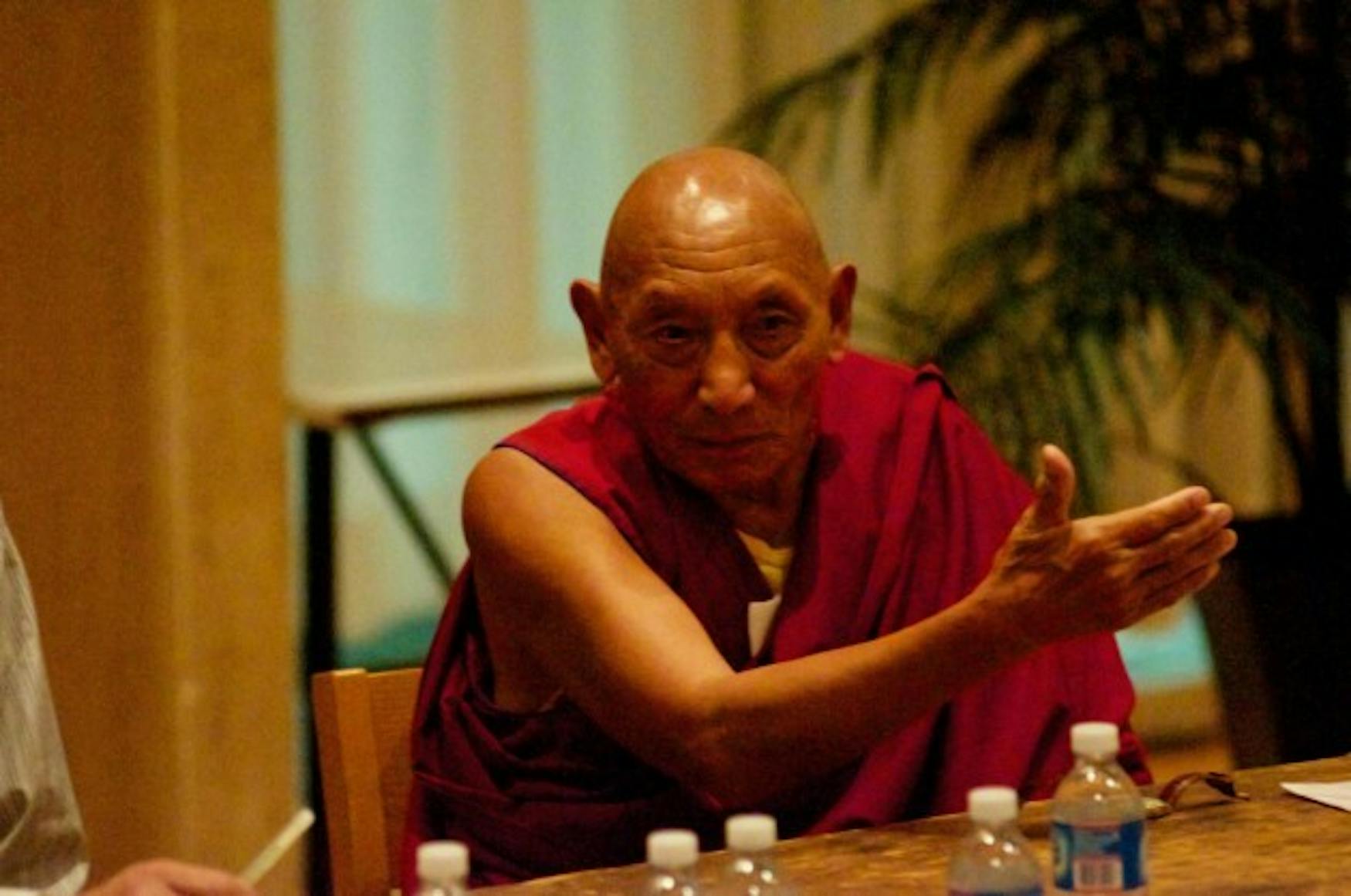Tibetan Buddhist monk speaks on human rights violations
Ninety-year-old Tibetan Buddhist monk Palden Gyatso, imprisoned for 33 years in Chinese prison and labor camps, visited Brandeis last week as part of a series of lectures to raise awareness about human rights violations in his home country.
He spoke last Tuesday in the Rapaporte Treasure Hall about maintaining his religious beliefs during his 33 years in a Chinese prison and labor camps.
The event was co-sponsored by Students for Tibet and the International Center for Ethics, Justice, and Public Life.
Palden spoke in Tibetan while an interpreter translated into English. He said that he was born in Tibet in 1933 and began studying at a local monastery at age 10. When he was 17, he joined a larger monastery just outside of the capital city of Lhasa to continue his study of Buddhist philosophy, he said.
On March 10, 1959, Palden traveled into Lhasa, where he observed people gathering to protest the Communist Party of China's occupation of Tibet. The protesters wanted the Chinese government to "go back to China to live peacefully there," Palden said. He joined in the "peaceful protest," which led to his arrest.
Palden was initially put in a Chinese prison in Tibet for seven and a half years. In 1961 and '62, a famine in the prison due to lack of food killed many inmates, Palden said. He tried to escape to India at this time but was arrested along the way, he continued.
He explained that he remained in prison until 1975, when he was sent to a labor camp to work for a brick company. He was returned to prison for an additional nine years after his time there and was released in 1992 after a total of 33 years in prison and labor camps.
During his time in prison, Palden underwent frequent torture. During his talk, he removed his dentures, explaining that he lost his teeth after undergoing electric shocks. Some prisons in Tibet today, he said, still torture their inmates.
"Luckily, I'm still alive," Palden said.
He said that his Buddhist teachings helped him during his time in prison. He explained that he does not hate the police or prison workers because they were following orders so that they did not lose their jobs, and he does not hate the Chinese government because it was doing what it believed was right at the moment.
Conflict between China and Tibet has resulted from the Chinese government "forcefully" imposing their practices on Tibet, Palden said. He explained that he does not argue for independence in Tibet or for the right to the land, but for religious autonomy and human rights.
"We are just trying to get a bit of freedom," he said, urging students to "investigate the real situation in Tibet."
Due to several factors, including economic constraints, he said Tibetans "have no power to resist what the Chinese government practices in Tibet." He hopes that Tibetans will be able to live "peacefully [and] harmoniously" with the Chinese.
"Everyone wants a happy life and a peaceful life and a … peaceful world," he said.
In the question-and-answer session that followed his talk, Palden elaborated on how his practice of Buddhism helped him during his time in prison. He said that he views anger as both an obstacle to his religious beliefs and inner peace and as a cause of self-suffering and "a lot of conflict and dispute in the world."
He also believes that his suffering could have been caused by having done harm to others in a past life.
In response to a question about how he remained compassionate while in prison, Palden said that he viewed suffering from a cause-and-effect perspective, focusing on the reasons for or circumstances around difficult times and understanding that others feel pain and suffering too.
Palden currently lives in Dharamsala in northern India.
In an interview with the Justice, Kunsang Gyurme '13, vice president of Students for Tibet, said that the goal of the event was "to educate everyone … from both sides of the issue [between Tibet and China]" particularly concerning issues of human rights and "having … basic freedom for Tibetan people" rather than politics.
David Weinstein, communication specialist for the International Center for Ethics, Justice, and Public Life, said in an interview with the Justice that the Center hoped for the event to "generate some … meaningful conversation and thinking around issues of international justice and human rights."
"I think the event was an opportunity for yet another individual's experience and perspective to become part of the conversation [about these issues] at Brandeis," he said.
Tenzing Yonten '12, founder and president of Students for Tibet, said in an interview with the Justice that the event received "a lot of support" from the Brandeis community.
He said that the club asked Palden to speak because of the "compassion" and "ingenuity" he exhibited in response to his imprisonment and his message that both the Chinese and the Tibetans should "solve the issue and look to the future, because he doesn't want anyone to go through the experience that he had been through."



Please note All comments are eligible for publication in The Justice.